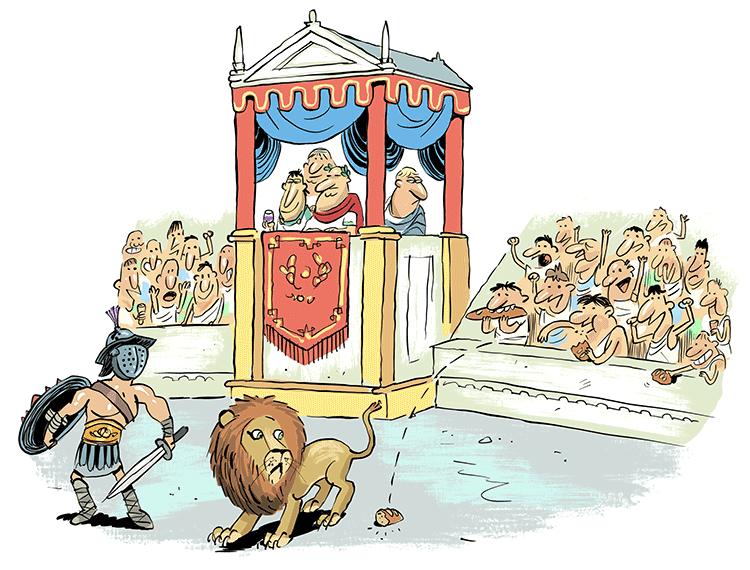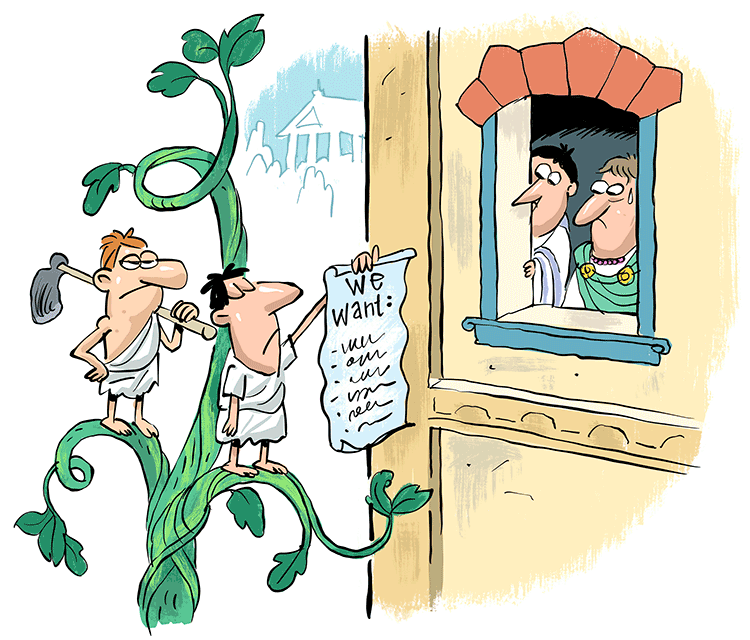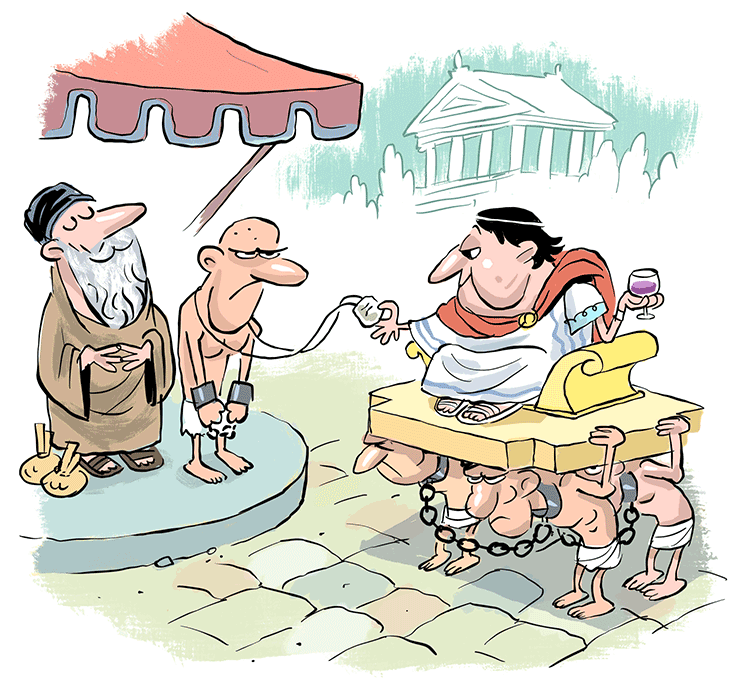For more than 500 years, the Roman empire was the only show in town, at least as far as the western world was concerned. No matter if you lived in Gallia (France), Hispania (Spain), Achaea (Greece), Cappadocia (Turkey), Syria, or Aegyptus (Egypt), you were a subject of the Roman empire.
As a result, you were required to follow certain laws, but, and this is something that makes the Roman empire unique in relation to all major empires that came before it, you were also afforded certain rights and privileges. But not universally. Like all societies, ancient Rome was stratified into different classes, each with their own position in society.
These classes, and their rights and privileges, changed throughout time. But their existence helped Rome function as such a large empire and gave the world important concepts that are still used in nation building today.

The Concept of Patronage in the Roman Empire
Just like any other ancient or modern society, the Roman empire was divided between those who ruled and those who were ruled.
However, unlike other ancient societies of the time, the Romans believed in and practiced a concept known as patronage.
This was the idea that the ruling classes had the duty of providing for the lower classes. Their whole claim to power was based on how well they were able to “take care of” their subjects.
A big reason for this was land ownership. Only elites could own land, and since land was where food was grown and wealth was created, regular people were helpless unless those in power chose to help out. And if they didn’t, well, people would rebel. This would cause all sorts of disruptions, and usually deaths.
Most elites wanted to avoid these rebellions at all costs; peace not only made for a better life, it kept them richer. This concept gave rise to the “bread and circuses” concept. This idea traces back to an old law that gave regular Roman people a certain allotment of bread, but it later became the concept that power was held by those who most successfully provided food and entertainment for the lower classes.
As Rome grew into a massive, international empire, providing for the lower classes began to mean different things. And to determine who was responsible for what, and who had which rights, it became necessary to more clearly define social rank.
The Rights of Roman Subjects
As with most ancient (and modern societies), social classes were fairly clearly defined and played an important role in the function of society.
In ancient Rome, which social class you belonged to determined the rights you had. The higher up you were, the more you had.
These rights were determined by law, and they included things such as:
- The right to vote in assemblies
- The right to hold political office
- The right to hold property and conduct business
- The right to marry
- The right to move to another part of the empire and retain citizenship
- The right to have a legal trial
- The right to not pay taxes
Part of what makes the Roman empire different from those that came before it was that the granting of these rights was often used to expand Roman power. People living in the far reaches of the empire could, potentially, enjoy some of the same rights as those living within the city limits of Rome.
Doing this not only helped ease tension in conquered territories, but it also helped people feel more “Roman.” They were no longer just conquered subjects forced to obey the laws of a foreign land. Instead, they were members of a society. Belonging to it and participating in it would then become in their best interest.
This, of course, didn’t always work. And it wasn’t universal. Being conquered by the Romans didn’t always mean you’d become a Roman citizen. Just as often you could be killed or sold into slavery. But if you manage to make peace with Rome, then you may be afforded certain rights.
Roman Social Classes
Roman social classes can trace their roots back to the founding of Rome. In the early days, Rome was a kingdom run by several powerful families, and the ancestors of these families continued to play an important role in the affairs of the city and its empire throughout its history.
On paper, Rome was a democracy. It had a Senate and several other elected bodies that gave common people a voice in the affairs of the state. But in reality, political power and wealth/social class were closely connected.
Upper classes held onto power by restricting the rights of lower classes and also by reserving political positions for those with a certain social rank, which was determined officially each year through the census (the annual counting of people and property).
In this sense, Roman social classes were not some abstract concept. Instead, they were very real distinctions that helped determine how Roman society would function.
Patricians
At the top of the social order were the patricians. This was essentially the aristocracy. In early Roman history, the patrician class was made up of members of Rome’s original families. Over time, the group expanded and was made up of the empire’s largest property owners.
However, one could not just become a patrician. This was a status given to you based on birth. You had to be born into one of the most powerful families to be considered a patrician. And it also couldn’t be taken away, unless you did something terrible against the state. Then you could be stripped of your status and sent into exile.
In the early days of the Republic, all of the political power in Rome was held by the patricians. For example, in the beginning, only Patricians could serve in the Senate.
This changed over time. Pressure from the lower classes (which were more numerous) led to reforms that took power from Rome’s elite and spread it out to more of the population.
This made the distinction of “patrician” slightly less significant, but not too much. The historic wealth and power of these families endured throughout the empire and they were almost always the major actors in Rome’s political history.
Equestrians
Today, the word “equestrian” means “of horses.” We get that word from Latin. But in this case, the connection to horses is more symbolic. It refers back to an ancient edict issued by Rome’s founders for members of the patrician class to form a cavalry that could be used to fight for Rome.
Over time, this connection to mounted troops faded and membership to the equestrian class became mostly about wealth. The connection made sense. Equipping a fighting force with horses would have been very expensive, even in ancient times. Therefore, the only ones able to comply with this edict would have been Rome’s most wealthy.
Shortly after Rome turned from a monarchy into a republic, this cavalry requirement was dropped and equestrian status became all about money.
When the census was conducted, if you met a certain wealth threshold, you were given the rank of eques. This opened up lots of doors for you, such as the right to serve on important political committees. In this way, the equestrian distinction was a way of keeping power consolidated into the hands of Rome’s upper classes.
However, unlike patricians, who couldn’t really lose their status unless they did something really bad, equestrians could be stripped of their title if business didn’t go so well. Be gone! They would yell. Back to the world commoners.

Plebeians
Although Rome had many social classes, the two most significant were the patricians, the rich nobles, and the plebeians, which was made up of pretty much all other Romans.
The official translation of “plebeian” is “commoner.”
In the early days of the Roman Republic, being a pleb, as they were called, was your ticket to an ordinary life. You couldn’t vote, couldn’t own property, and could only marry other plebeians. The course of your life was very much determined by the wills and whims of the patrician class.
This changed relatively quickly, however. As is usually the case in stratified societies, there were far more people in the lower plebeian class than patricians. Staying in power therefore required granting more and more rights and freedoms to these lower classes. Otherwise, they might rebel and cause all sorts of problems.
By 287 BC, which marks the end of a period of class struggle now called the Conflict of the Orders, plebeians were given much more power. An assembly made up of plebs had veto power against the senate, plebs could own property, and they could also hold political office. They were eventually even allowed to marry patricians.
If a pleb gained enough wealth, they could be designated as an eques, granting them access to the rights enjoyed by the equestrian class.
However, this was the closest a pleb could come to being a patrician. Pleb status, like that of the patricians, was determined by birth and could not be changed. But if you married a patrician and had children, they could become patricians (though not always).
Freed Slaves
Next on the Roman social pyramid are the “freedmen” or freed slaves. These individuals were likely subjects of a foreign land that had been conquered and that had either purchased their freedom or had it granted to them as part of a political gesture from Rome’s ruling elite.
In most cases, despite having the name “free” attached to your name, being a freedman came with certain restrictions. For example, most freedmen were not allowed to leave the province in which they lived, otherwise they would lose their freedoms. Or, they may have to devote a certain amount of time to military service in exchange for their freedom.
Some exceptions existed, but for the most part, freedmen could not own property, vote, or hold any sort of political office. Being in this class was certainly better than being a slave, but not by much.

Slaves
As is the case with most ancient societies, the bottom group of the Roman empire were slaves. Those who lost wars against Rome, if not killed, were usually sold into slavery. However, some people, such as those in a lot of debt, might sell themselves into slavery for a period of time. Can you imagine?
Roman law and government talked a lot about equality and made great advances in terms of creating a unified society. But the vast majority of the manual labor needed to actually build an empire was done by slaves, who were considered less than human.
The need to find new slaves to do more work was often the justification for wars of conquest, though politicians usually used some other excuse, such as an aggression or the need to defend Rome. Even back then they had propaganda.
Universal Roman Citizenship
The existence of social classes in Rome was not new. But something Roman society gave the world that it didn’t have before was the concept of citizenship.
Originally, a Roman citizen was someone who actually lived in Rome, and who was not a slave or a freedman. However, almost as soon as Rome began expanding its borders it reworked its definition of citizenship. First people in nearby lands were granted this status, and, over time, so too were people in the faraway provinces.
By 212 AD, the Edict of Caracalla granted citizenship to all free people of the empire.
This was something entirely new. The idea of citizenship is that it is a status that grants a person certain rights and protections that cannot be taken away. The purpose of it was to try and build people’s allegiances to Rome, which for most people in the empire was hundreds if not thousands of miles away.
The idea was that by agreeing to accept Roman power, you would improve your own status locally. It was an advanced version of patronage. Instead of providing “bread and circuses,” the ruling elites would now provide certain legal protections and grant political participation to the masses.
This helped create a more cohesive Roman identity, one that could be felt across the vast expanse of the empire. This helped make the empire more unified and is a big reason why it was able to endure for so long.
Roman Society as a Model for Modern Nations
The modern concept of citizenship is based on this Roman idea. Though the Romans still had slavery, and they restricted the rights of women, this concept of universal citizenship has been at the core of nation building ever since.
The concept of citizenship goes against the idea of hereditary rule and social status. In other words, it helped reduce the importance of one’s birth in determining where they stood in society.
Of course, it didn’t eliminate it. Royal and noble families continued to dominate European politics throughout the Middle Ages. But during the Renaissance and Enlightenment, when people began questioning the political order, they drew on this concept of Roman citizenship to point out that individual members of society should be afforded certain rights and freedoms simply for belonging to one nation or another.
Today, people talk about global citizenship, the idea that simply by existing on this planet each person has certain rights. A good idea, it’s far from reality. But the fact we even discuss it is thanks to Rome’s decision to put this concept into practice.
Written by Matthew Jones
Illustrated by Jean Galvao
